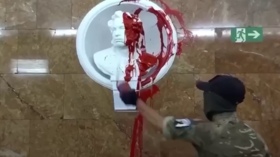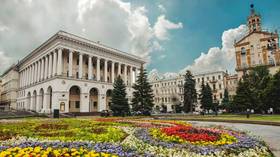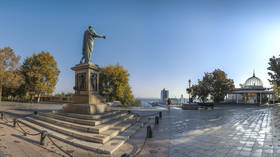Ukrainian neo-Nazis target Pushkin bust

A bust of 19th-century Russian poet Alexander Pushkin was allegedly attacked by a group of Ukrainian neo-Nazis in a Kiev metro station this week.
A video that has surfaced on social media shows two masked men wearing military-style clothes pouring red dye on the bust. One of them can be heard saying, “Glory to Ukraine!” and calling their act a “creative” performance. One of the men also appears to be wearing an insignia that resembles an emblem of the Right Sector neo-Nazi group – which is considered a terrorist group by Russia.
The metro station appeared to be empty at the time of the act and the Kiev authorities have so far not reacted to the vandalism.
The stunt comes as Ukraine increasingly seeks to rid itself of any cultural references to Russia, ranging from street names to monuments.
In June, the Kiev authorities renamed several metro stations in the city. Leo Tolstoy Square has been renamed in honor of Vasyl Stus, a local poet. There was also a petition to change all Pushkin Streets across Ukraine to the name of American writer Stephen King, but it failed to gather enough signatures.
The Kiev Conservatory, which is officially named the Pyotr Tchaikovsky National Music Academy of Ukraine (UNTAM) after the Russian composer, has so far resisted the trend that has engulfed Ukraine since the start of the Russian military campaign in February. In June, its board refused to rebrand and remove the composer’s name.
The Ukrainian Education Ministry has revealed plans to wipe Russian literature out of the nation’s school curricula. Deputy Education and Science Minister Andrey Vitrenko said in June that “everything that somehow connects us with the Russian Empire should be thrown out.”
The ministry has not yet officially announced any changes, but local media has reported that Alexander Pushkin, Fyodor Dostoyevsky, Leo Tolstoy, Mikhail Bulgakov, and other iconic Russian authors are among those to be banned.
Russia sent troops into Ukraine on February 24, citing Kiev’s failure to implement the Minsk agreements, designed to give the regions of Donetsk and Lugansk special status within the Ukrainian state. The protocols, brokered by Germany and France, were first signed in 2014. Former Ukrainian President Pyotr Poroshenko has since admitted that Kiev’s main goal was to use the ceasefire to buy time and “create powerful armed forces.”
In February 2022, the Kremlin recognized the Donbass republics as independent states and demanded that Ukraine officially declare itself a neutral country that will never join any Western military bloc. Kiev insists the Russian offensive was completely unprovoked.














